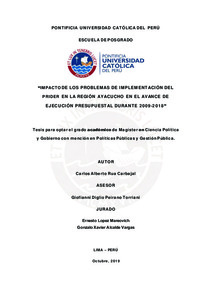| dc.contributor.advisor | Peirano Torriani, Giofianni Diglio | |
| dc.contributor.author | Rua Carbajal, Carlos Alberto | |
| dc.date.accessioned | 2021-09-15T20:59:24Z | |
| dc.date.available | 2021-09-15T20:59:24Z | |
| dc.date.created | 2019 | |
| dc.date.issued | 2021-09-15 | |
| dc.identifier.uri | http://hdl.handle.net/20.500.12404/20357 | |
| dc.description.abstract | El Programa Regional de Irrigación y Desarrollo Rural Integrado – PRIDER es
uno de los tres programas a nivel de unidad ejecutora que cuenta con capacidad
de poner en funcionamiento proyectos de inversión pública en el país (MEF:
2019) y por eso queremos analizar el desarrollo de la implementación del
PRIDER en el Gobierno Regional de Ayacucho en el nivel de avance
presupuestal durante el 2009 al 2018.
La tesis opta por una metodología cualitativa y cuantitativa a manera de un
estudio de caso que vincula elementos narrativos así como entrevistas
semiestructuradas a los actores involucrados como los funcionarios y ex
funcionarios del PRIDER. La metodología realizada también incluyó revisión
bibliográfica y sustentación de la información del portal amigable del Ministerio
de Economía y Finanzas - MEF a fin de poner contrastar nuestra tesis desde la
teoría y el análisis. Finalmente con los datos de campo ya analizados se procedió
a utilizar el programa de software libre R para realizar la correlación entre el factor
riego con el avance general del PRIDER mediante el coeficiente de Pearson a
fin de encontrar patrones importantes.
Las principales conclusiones observan que los programas regionales tienen
cuestionamientos por presuntos actos de corrupción pero a la vez presentan
grandes potencialidades para la inversión pública. En el caso del PRIDER que
es creado por un factor contextual, desabastecimiento del proyecto predecesor
RIO CACHI y por cuestionamientos de corrupción; se puede afirmar que durante
la implementación tuvo una fase precaria, de crecimiento y de trasferencias a
unidades ejecutoras. Los problemas de implementación durante estas fases
fueron tanto internos como externos que impactaron negativamente en la
ejecución de gasto entre los años 2009 a 2018. En la ejecución el factor riego es
directamente proporcional al avance en contraste a Desarrollo Rural Integrado. | es_ES |
| dc.description.abstract | The Regional Program for Irrigation and Integrated Rural Development - PRIDER
is one of three programs at the level of the executing unit that has the capacity to
put public investment projects into operation in the country (MEF: 2019) and that
is why we want to analyze the development of the implementation of the PRIDER
in the Regional Government of Ayacucho at the level of budgetary progress
during 2009 to 2018.
The thesis opts for a qualitative and quantitative methodology in the form of a
case study that links narrative elements as well as semi-structured interviews to
the actors involved such as officials and former PRIDER officials. The
methodology also included bibliographic review and information support from the
friendly portal of the Ministry of Economy and Finance - MEF in order to contrast
our thesis from theory and analysis. Finally, with the field data already analyzed,
the free software program R was used to correlate the irrigation factor with the
general progress of the PRIDER through the Pearson coefficient in order to find
important patterns
The main conclusions observe that the regional programs have questions about
alleged acts of corruption but at the same time present great potential for public
investment. In the case of the PRIDER that is created by a contextual factor,
shortage of the RIO CACHI predecessor project and corruption questions; it can
be affirmed that during the implementation it had a precarious phase, of growth
and of transfers to executing units. The problems of implementation during these
phases were both internal and external that had a negative impact on the
execution of expenditure between the years 2009 to 2018. In the execution the
irrigation factor is directly proportional to the progress in contrast to Integrated
Rural Development. | es_ES |
| dc.language.iso | spa | es_ES |
| dc.publisher | Pontificia Universidad Católica del Perú | es_ES |
| dc.rights | info:eu-repo/semantics/openAccess | es_ES |
| dc.rights | Atribución-NoComercial 2.5 Perú | * |
| dc.rights.uri | http://creativecommons.org/licenses/by-nc/2.5/pe/ | * |
| dc.subject | Desarrollo regional--Perú--Ayacucho | es_ES |
| dc.subject | Desarrollo rural--Perú--Ayacucho | es_ES |
| dc.subject | Planificación regional--Perú--Ayacucho | es_ES |
| dc.title | Impacto de los problemas de implementación del PRIDER en la Región Ayacucho en el avance de ejecución presupuestal durante 2009-2018 | es_ES |
| dc.type | info:eu-repo/semantics/masterThesis | es_ES |
| thesis.degree.name | Magíster en Ciencia Política y Gobierno con mención en Políticas Públicas y Gestión Pública | es_ES |
| thesis.degree.level | Maestría | es_ES |
| thesis.degree.grantor | Pontificia Universidad Católica del Perú. Escuela de Posgrado | es_ES |
| thesis.degree.discipline | Ciencia Política y Gobierno con mención en Políticas Públicas y Gestión Pública | es_ES |
| renati.advisor.dni | 40053002 | |
| renati.advisor.orcid | https://orcid.org/0000-0003-1724-5779 | es_ES |
| renati.author.dni | 28527049 | |
| renati.discipline | 312167 | es_ES |
| renati.juror | Lopez Mareovich, Ernesto | |
| renati.juror | Peirano Torriani, Giofianni Diglio | |
| renati.juror | Alcalde Vargas, Gonzalo Xavier | |
| renati.level | https://purl.org/pe-repo/renati/level#maestro | es_ES |
| renati.type | http://purl.org/pe-repo/renati/type#tesis | es_ES |
| dc.publisher.country | PE | es_ES |
| dc.subject.ocde | http://purl.org/pe-repo/ocde/ford#5.06.00 | es_ES |






